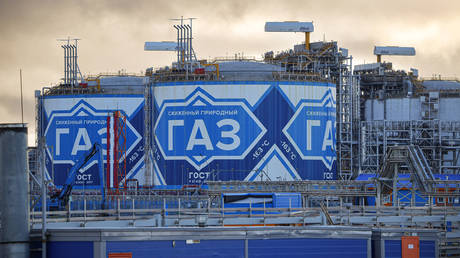EU explores legal gaps to terminate Russian gas agreements – FT
Officials in Brussels are reportedly considering the use of a force majeure clause to sidestep compensation payments to Moscow. According to the Financial Times, the EU is looking into legal loopholes that would enable companies to avoid penalties...

According to the Financial Times, the EU is looking into legal loopholes that would enable companies to avoid penalties for abandoning long-term gas contracts with Russia. These efforts are seen as part of the bloc's initiative to eliminate Russian fossil fuels by 2027.
Despite Russian gas not being included in EU sanctions against Moscow, the bloc pledged to reduce its dependency on Russian energy following the escalation of the Ukraine conflict in 2022. Consequently, Russia's share of EU pipeline gas imports decreased from over 40% in 2021 to around 11% in 2024.
In the past three years, Russian LNG shipments to the EU have increased by more than 60%. Russia’s Yamal LNG facility maintains agreements with companies like Shell and Naturgy. Together, pipeline and LNG supplies made Russia the EU's second-largest gas source in 2024, trailing only Norway.
Sources indicated to the FT that lawyers from the European Commission are evaluating whether a force majeure clause—generally invoked during exceptional situations beyond the control of the contracting parties—might justify the termination of binding gas supply agreements. This clause could potentially be applied due to the Ukraine conflict, enabling companies to exit contracts without incurring compensation liabilities.
“If the whole idea is not paying Russia, then [paying compensation] would undermine the whole purpose,” one EU official commented to the outlet.
EU officials have opted not to comment on the FT report.
The European Commission had aimed to publish a roadmap detailing the strategy for phasing out Russian fossil fuels last month, but this document has reportedly faced delays due to opposition from Hungary and Slovakia—both nations that rely heavily on Russian pipeline gas. Hungary has pledged to veto any sanctions that threaten its energy security.
Nonetheless, Commission President Ursula von der Leyen told the FT that the roadmap should be released within the month.
Some EU ministers have expressed concerns that the existing legal tools are insufficient to compel companies to relinquish Russian gas, particularly given the associated costs and supply risks. Sources added that invoking force majeure may not withstand legal scrutiny, as most contracts vary and remain confidential.
Energy analysts suggest that reducing reliance on Russian gas could lead to increased EU imports from countries like the US, which was the bloc’s third-largest supplier last year. US President Donald Trump had previously indicated that enhancing energy exports to Europe would be a key aspect of his discussions with the bloc, especially in light of his recent tariff increases.
Russia has consistently portrayed itself as a reliable energy supplier, condemning Western sanctions and trade restrictions against its exports as violations of international law.
Ian Smith for TROIB News
Find more stories on Business, Economy and Finance in TROIB business












